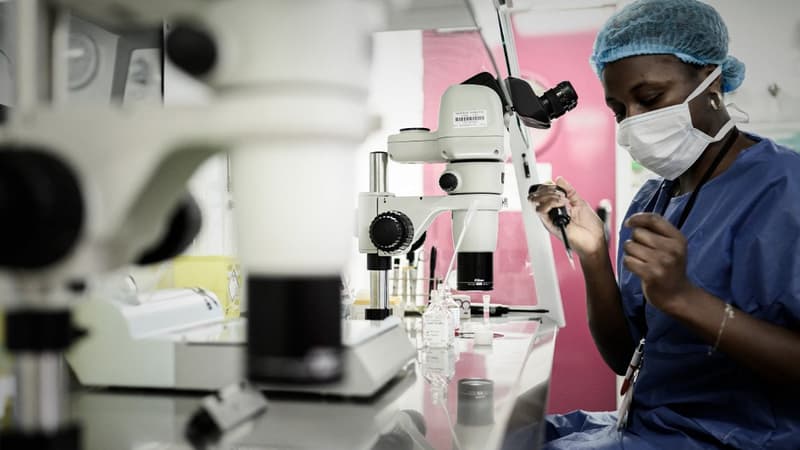Artificial intelligence (AI) is sometimes worrisome… but it can also promise extraordinary advances. This is particularly the case in the medical field, where researchers are working on algorithms to save lives.
One of its uses refers, for example, to the detection of cancer. ADMIR, a French startup, has invented an innovative scanner capable of providing a diagnosis of cancer with precise information and above all very quickly.
The function of the machine is to analyze biopsy sheets, a sample taken from a very small piece of tissue or organ in a specific area to see if there is a tumor or not.
Very specifically, the machine works as an infrared scanner and performs a biochemical study of these blades by observing them. Then, in less than an hour, it is capable of detecting and providing information on the type of cancer, its stage of progress, or even the area of origin.
“All the information that can be useful to the doctor to make a diagnosis is above all helpful,” he continues.
artificial intelligence, including machine learning, is the core of the process of this machine. “We write the algorithms ourselves,” the founder specifies. The machine was developed over 5 years within the French Commission for Alternative Energies and Atomic Energy (CEA) and six people are currently working on this project involving physicists, biologists and AI specialists.
For the artificial intelligence to work, it mainly had to be trained by showing it images of pre-existing biopsy slides. ADMIR has already presented around fifty blades to his AI, but for it to be truly accurate, he needs thousands. These first blades are provided by French hospitals. “The data is obviously anonymized, we do not have access to the medical data of the patients,” says the founder.
At this stage for ADMIR, the goal is to continue training the AI and eventually make the machine available to hospitals and clinics. “The system has assured analytical relevance, now it is necessary to show diagnostic interest, that is, to develop its industrial application”, specifies Laurent Duraffourg.
The use of technology and in particular of AI in the detection of cancers is developing since “the number of cases is also increasing because they are detected better and earlier,” he continues. ADMIR was present at CES 2023 to present its prototype.
This type of project is in line with the vision of Professor Jean-Emmanuel Bibault, an oncologist, radiotherapist and researcher in artificial intelligence. “AI also makes it possible to do what the human doctor cannot do,” he adds.
in his book 2041: The Medical Odyssey (Ecuador Editions), takes an inventory of the current and future place of artificial intelligence in the medical field based on previously published studies. “My goal is to demystify AI and prevent people from thinking that this technology will completely replace the doctor,” Jean-Emmanuel Bibault explains to Tech&Co.
Artificial intelligence is, above all, a source of hope for medical progress in the coming years. “AI will be integrated, like other devices, into an essential therapeutic arsenal for the doctor, who must maintain control”, analyzes the oncologist. The researcher is convinced of what he calls “the stethoscope of the 21st century.”
Among the most promising uses, AI in radiology with an algorithm capable of identifying twenty pathologies in this type of examination with incredible precision. In the near future, AI will also be used in dermatology: by downloading apps, it will be possible to scan your skin with your phone, have diagnostic guidance and thus reduce appointment times with these specialists.
“What we saw in science fiction books becomes real,” he continues. This Stanley Kubrick fan, who has passed through Stanford, is well aware of the questions raised by these new practices. Especially when giants like Google are investing in research and development of artificial intelligence for medicine.
In 2019, the Google-led Nightingale project illustrated the issues that the use of medical data by GAFAMs can raise. The project consisted of retrieving the medical records of several million patients from a network of hospitals as part of a research agreement. Except there were issues with anonymizing the data: Google employees had access to it even though patients and doctors weren’t informed of this research program.
However, Jean-Emmanuel Bibault believes that it is important “not to ostracize GAFAM and to continue working with them as long as it is done according to the rules of the art.” He particularly highlights the fact that these companies have a significant number of engineers.
“You have to realize that all of these AI tools really do bring hope to patients. As clinicians, we have a responsibility to develop them to make them available and improve care. It wouldn’t be responsible to give up on AI in relation to the medical advances we need.” , as in oncology for example”, he develops.
But the doctor does not forget the limits.
And to monitor these new practices, the National Ethics Advisory Committee (CCNE) took charge of the issue. On January 10, the CCNE issued a joint opinion with the Pilot National Digital Ethics Committee. The opinion sets out sixteen recommendations on the use of artificial intelligence in medical practices, including the need for “human control at all stages of care.” Jean-Emmanuel Bibault, retains from this opinion the importance of integrating artificial intelligence in the teachings of medicine.
Now, AI is growing in daily health monitoring. The oncologist predicts that applications in this area will soon emerge. The patient will provide the symptoms of it and based on the previous health information, the application can alert the treating doctor if any abnormality is detected (weight loss, abnormal symptoms…).
According to Jean-Emmanuel Bibault, the challenge for the next few years will be to face Chinese and American competitors who have a much larger population than ours and therefore a huge field for testing and implementing artificial intelligence in healthcare. .
Source: BFM TV


